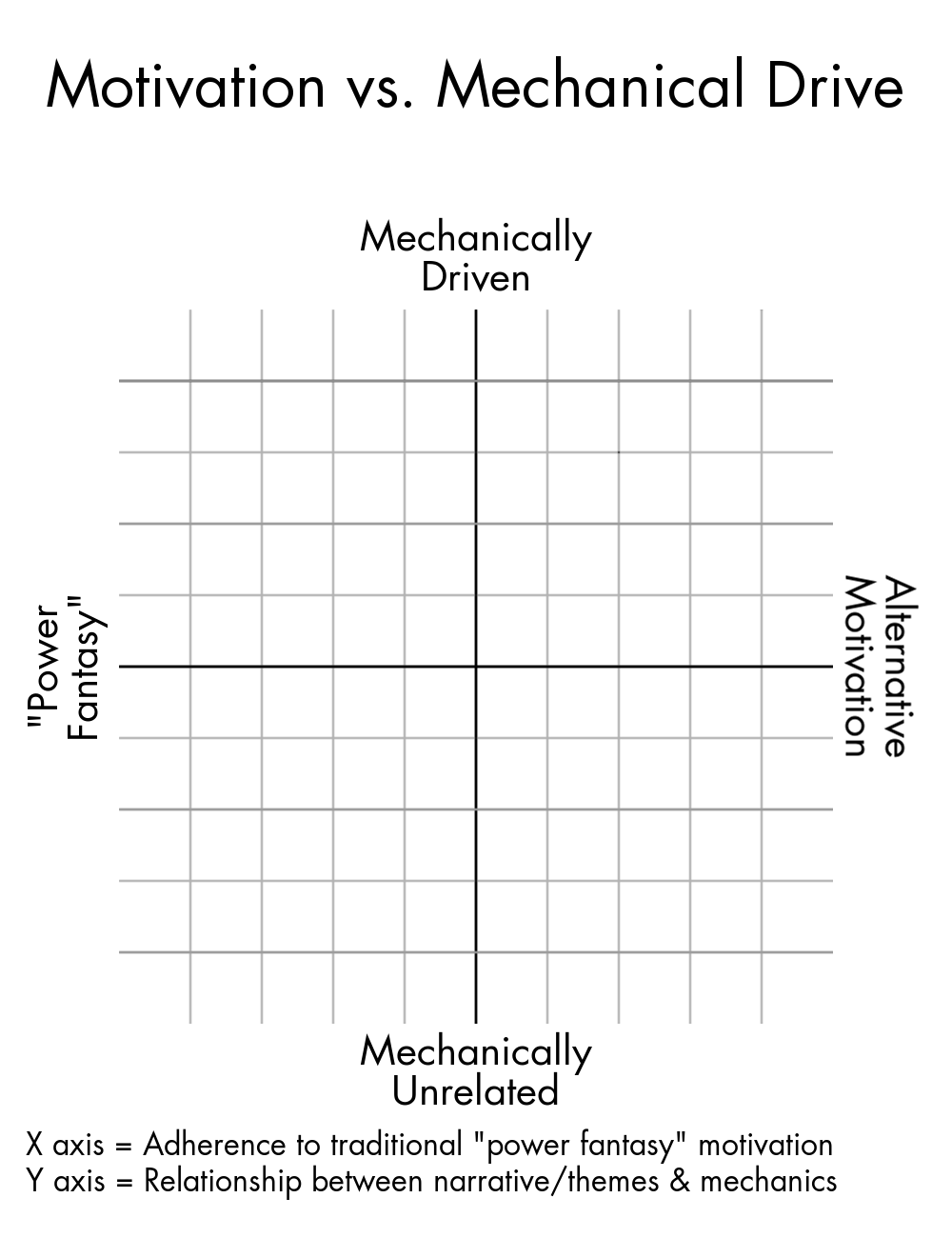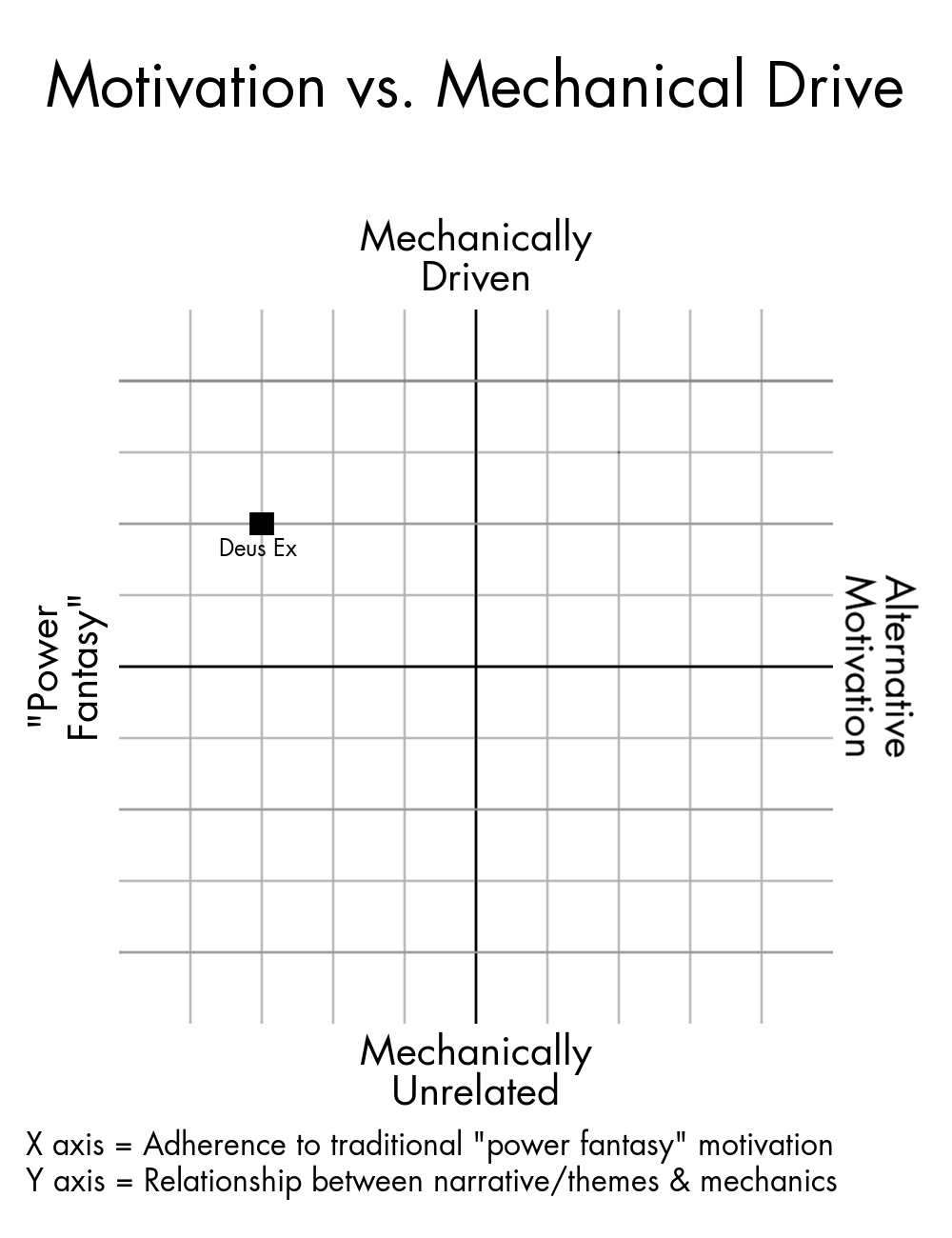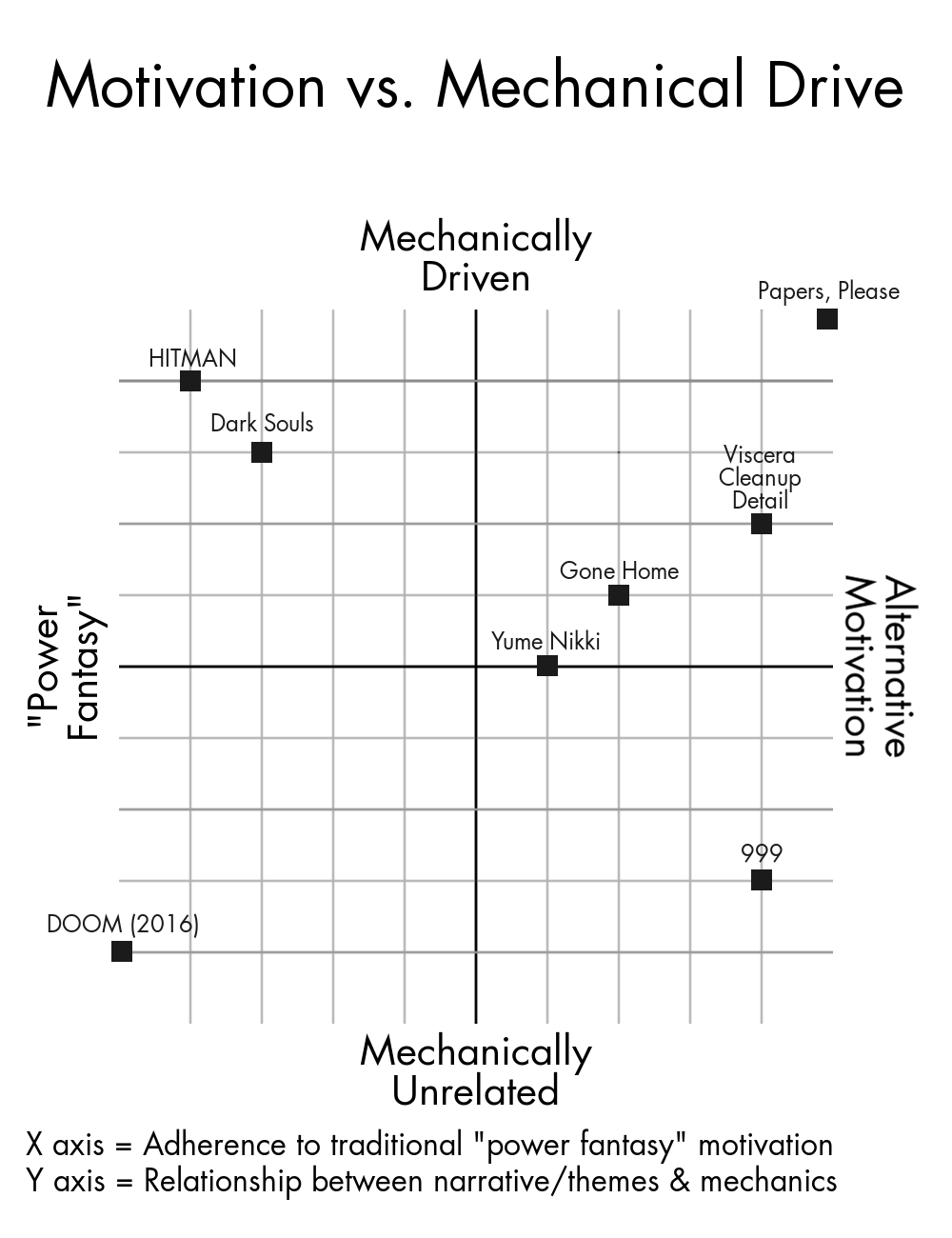Motivation, Drive, and Indulgent Pulp
By mabaseslums 3 Comments
As I was laying my head down to sleep last night, I jolted awake when two of my transient thoughts locked into one another. I was more annoyed than anything, if we're being honest. I was tired. However, I was aware enough to jot down a quick idea (with my great phone handwriting), and, unlike most of my ideas, I think this one is good?

To put it as simply as I can, it's an XY chart (or scatter chart) (or plot chart) that relates a game's primary motivator to how its mechanics convey its themes. I was inspired by Errant Signal's recent video on Deus Ex, in which he categorizes Immersive Sim games as "The Thinking Man's Indulgent Pulp". Deus Ex, in particular, is a game that's revered for two seemingly opposed successes: complete variety for the player to consume, and having a tightly-knit "world" that speaks clearly of its ideas. How it reaches that point is with primarily motivating players through achievement and upwards character building - a "power fantasy", as I'll continuously use from here on, quotation marks included. It's quite clear that it's primarily interested in being as such what with the action-RPG bent and the "levels as puzzles" mentality, but there are some things along the way that subvert and challenge that. [18-year-old spoilers ahead] For example, it's extremely difficult to save your brother from dying if you're fully specing into a non-violent route. It's not enough for it to sway completely in the opposite direction, but hey, it's there.
On the other axis (literally), the game is equally, perhaps more, dedicated to its world-building and narrative, going so far as to validate its litany of options in the scripting of the game. Mechanically, however, the game's level design and driving mechanical breadth involves gunplay and stealth. It's hardly a wholly dedicated study of future-globalism and conspiracy. Regardless, the efforts that are made to keep the world of Deus Ex from becoming just a sandbox-y labyrinth during play (and therefore straying into complete lunacy) are definitely worth addressing.
So, with all that in mind...

Possible Questions
Q: This doesn't seem like much of a spectrum at this point. It's more of a "yes/no" thing, don't you think?
While there are many cases in which the extremes of the chart apply, I think the interesting data lies in things that don't definitively reach one side or the other. To hopefully sway you, I've concocted a legend to the points on each axis and how I personally interpret what that placement implies:
| X axis | Y axis |
|---|---|
| 5 | Complete adherence to a motivation alternative to "power fantasy" | 5 | Narrative/themes exclusively driven by mechanics |
| 4 | Nearly complete adherence to alt. motivation, showing small influence of "power fantasy" | 4 | Narrative/themes reliably driven by mechanics |
| 3 | Mostly adheres to alt. motivation, while partially involving "power fantasy" | 3 | Narrative/themes driven by mechanics primarily, with other methods employed, as well |
| 2 | Usually adheres to alt. motivation, though "power fantasy" is noticeably informing | 2 | Narrative/themes have mechanical drive alongside other methods |
| 1 | Motivation mixed between alt. & "power fantasy", biased to the former | 1 | Narrative/themes use a mixture of mechanics & other methods, biased to the former |
0 | Complete mix between alt. and "power fantasy" motivations | 0 | Narrative/themes equally driven through mechanics and other means |
| -1 | Motivation mixed between alt. and "power fantasy", biased to the latter | -1 | Narrative/themes use a mixture of mechanics & other methods, biased to the latter |
| -2 | Usually adheres to "power fantasy", though alt. motivation is noticeably informing | -2 | Narrative/themes have other drive alongside mechanics |
| -3 | Mostly adheres to "power fantasy", while partially involving alt. motivation | -3 | Narrative/themes driven with other methods primarily, with mechanics employed, as well |
| -4 | Nearly complete adherence to "power fantasy", showing small alt. influence | -4 | Narrative/themes reliably driven by other means |
| -5 | Complete adherence to a "power fantasy" motivation | -5 | Narrative/themes completely unrelated to mechanics |
Here are some other examples that hopefully drive home my point!

Q: What does "alternative motivation" even mean?
It's a general (perhaps overly general, admittedly) term to couple with "power fantasy", the traditional motivator throughout the history of gaming. In this case, it'd probably be more worthwhile to define that. "Power fantasy" describes a game whose way of leading you through its "path" involves an uphill of mastery, either of abstracted mechanics or the ingame structure (or both!). To put it simply, if you play the first level of a game after beating it and it's now really easy, it probably involved some of that stuff. Anything else could be considered "alternative". Examples include being narratively-driven, subversion of the "power fantasy", or being based on a completely static experience with no sense of mastery.
Q: Where do competitive multiplayer/abstract/"narrative-less" games fit into this? What about survival/open-world/non-violent/exploration games??
That's where the fun of this chart is! If you've never thought about a game's intended motivation, this seems like a good time to learn why you play that game. If a game is based primarily on getting a good high score, would that be considered a "power fantasy"? What if said score always leads to an ingame death? If a survival game has no win state, could you say its subverting "power fantasy" despite the violent gameplay? I dunno! You tell me!
I could see a game not fitting entirely when it crosses genres and/or motivators (e.g. NieR). However, I think using multiple plot points could solve the issue.
Q: What is the purpose of this even?
Like how, say, a political compass can show a person's values in a simple, yet comparable way, this XY chart could show games' values as a piece of interactive art in a simple, yet comparable way. Similarly, it can show the values of both the fans and critics of a game, its motivator, or its "narratology" (I went this long without using it). After some messing around with the chart, the relationship between motivation and mechanical drive revealed how closely similar-genre games sit next to each other. Non-violent, exploratory games occupy a strip of the grid, whereas full-on fantastical murderous sandboxes did the same somewhere else entirely.
It could very well point out other trends and commonalities, though. I'd be interested in seeing a long-running studio have their gameography charted out to see how they've changed over the years, for instance.
I'm worried that this chart will imply that I'm a die-hard ludology vs. narratology person; like, that if a game doesn't have a glue-to-paper relationship between its themes and mechanics, or if a game indulges in some (dare I say) fantasy fulfillment, it's veering away from "The One Goal". That is not so. I'm hoping this chart provides some insight into how games (both singularly and collectively) achieve their own personal goals within the context of these essential, ludo-exclusive, conditions. Some games will be a solid (5, 5), others'll be (-5, -5). The chances of both of those games being successful is entirely up to taste.
Conclusion
Overall, this ain't too bad for a nearing-dream-state thought turned photoshop project. Full disclosure, I'm not sure if the wording presented on the chart is as optimal as I'd want it to be. I tried to avoid implying one way was worse than the others, and might have lost the plot in the meantime. I'm not entirely sure this is gonna be the final revision of it, depending on if I ever take the time to refine. Still, I learned something today! Hooray!
Q: Hey, shouldn't the X Axis labels be the other way around?
Fuck. Fuck, shit. Goddammit.

3 Comments